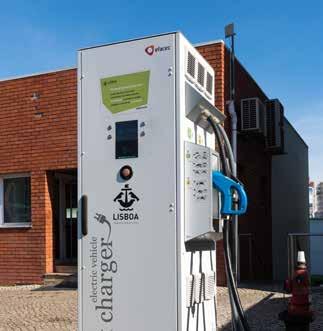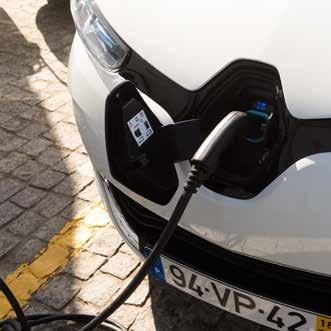
7 minute read
Keeping the City Moving
Over 20,000 bicycle journeys are made daily using the public bicycle sharing scheme. By 2021, 3,000 bicycles will be available in the programme
With 55% of the actions to reduce emissions focused on transport, mobility plays a key role in Lisbon’s sustainable transition. Despite significant improvements in recent years, there are still many problems related to air pollution and noise impacts on human health and ecosystems, as in most major cities. Lisbon is tackling these challenges through a wide range of alternative transport options to encourage people to leave their car at home. This includes better public transport with more bus lanes, a more frequent service and lower tariffs; more and wider footpaths; additional cycling lanes and bicycle parking facilities; and shared bicycle, scooter and car schemes. So far, walking and cycling has increased from 18% in 2011 to 32% in 2017.
Advertisement
Low Emissions Zone
In 2011, Lisbon created the first Low Emissions Zone (LEZ) in Portugal. Located in the central downtown area, LEZ covers approximately 30% of the city and involves restrictions to the most polluting fossil fuel cars and a transformation of road into public space for pedestrians, cyclists and public transport. In addition, several 30 km per hour zones are being introduced to further improve air quality within neighbourhoods, while also increasing safety and promoting sustainable modes of transport like cycling and walking.


Lisbon’s citizens are reducing their carbon footprint thanks to the city’s approach to sustainable transport management and a wide range of alternative transport options to encourage people to leave their cars at home, such as reduced fares, more bus lanes, improved footpaths, and bike, e-scooter and car sharing services
Public Transport
Encouraging the use of public transport is key for Lisbon’s CO2 emissions reduction target. To embody this strategy, starting April 2019, Lisbon has interlinked all its public transport services - buses, trams, trains, subway, funiculars and lifts - in a single brand and ticketing scheme across the metropolitan area, servicing 2.8 million citizens.
Two million journeys are taken on public transport each day.
20% more public transport journeys were taken in 2019 after the city’s strategy change.
Monthly travel passes now offer unlimited journeys within the city for just one euro per day, and €1.30 per day across the 3,015 km2 of the metropolitan area. Entire families can travel for the cost of two monthly tickets, which can represent up to 86% savings.
Public transport is free for children under age 13 and has a reduced fee for adults over 65.
93.3% of Lisbon’s population lives within 300 metres of an hourly (or more frequent) public transport service.
Eleven new neighbourhood bus lines run short routes within neighbourhoods, connecting public services to schools, markets and other essential spots. These are designed to improve the lives of those that have mobility constraints to be able to better move about in their area of residence. Soon, all of the 24 urban districts in Lisbon will have one of these neighboourhood routes.
Pedal Power
Despite being known as the “City of the Seven Hills”, cycling is on the rise and between 2016 and 2017, Lisbon saw an increase of circa 700% in bicycle use.
20,000 journeys are made every day in the municipal shared bike system. Almost two thirds of these bikes are electric, ideal for accessing Lisbon’s hilly streets or for the less confident cyclists. The city plans to increase the number of bicycles available in the municipal bike sharing system to 3,000 by 2021.
Several e-scooter operators have deployed in Lisbon, readily accessible via smartphone apps, resulting in 8,500 trips each day.
Rosa Félix – The Cycling Scientist
A native of Lisbon, Rosa Félix has a passion for cycling. The Cicloficina dos Anjos is a community bike workshop where anyone can go to have their bike repaired for free.
“We have the tools, the parts and the knowledge to repair bikes and teach people how to fix them so they may become independent and do it themselves”. “The Cicloficina dos Anjos It started in a carparking space where a group is probably the best one of people gathered once a month to fix as it has more parts, more bicycles. By 2011, a fixed physical space was space, is open at least twice secured and since then hundreds of bicycles a week and gets dozens of have been repaired and recovered around people learning how to fix Lisbon. their bikes”

Parts are collected from shops and people who
says Rosa Félix
no longer need them. In Portugal, there are now more than ten such bike workshops. As part of its Urban Mobility Package4, the European Commission reinforces its support for actions that support sustainable urban transport such as cycling.


Over 90% of Lisbon’s municipal light fleet is comprised of electric vehicles (e-cars)
Pedestrian Priorities
Pedestrians are also a high priority for Lisbon. The city has a clear vision for sustainable urban mobility, with measures to restrict car use and prioritise public transport, cycling and walking. Since 2013 a mandatory Pedestrian Accessibility Plan has been applied in all public space interventions. The plan, developed in consultation with a wide range of stakeholders, sets mandatory requirements for any project within the Lisbon City Council area. It includes minimum widths and specifications for footpaths; levelled pedestrian crossings; and car-free zones. All new projects must comply and a programme is in place to systematically implement the standards across existing areas.
Footpaths have been widened and new paths created in recent years to improve quality and comfort for pedestrians.
Of the city’s 9,400 pedestrian crossings, 400 have been upgraded to improve accessibility and the remaining 9,000 will be completed in the coming years.
As a result, several urban districts are already 100% accessible for all citizens and visitors to enjoy, including older people, families with small children and people with disabilities.
Fuelling the Change
Fostering public transport use is key for Lisbon’s greenhouse gas emissions reduction target. In 2009, the city adopted a policy of clean electric mobility and is currently implementing an innovative 2 MW solar power plant within the city, to charge the growing municipal e-bus fleet.
Electric Vehicles (EVs)
Not all travel can be done using public transport or on bikes, so Lisbon encourages and promotes car sharing and car-pooling initiatives; and has installed 540 public e-charging points across the city.
In 2008, the Portuguese Government launched the National Programme for Electric Mobility (MOBI.E - Mobilidade Electrica) under the Portuguese National Energy Strategy 2020. Its objectives included promoting the uptake of EVs throughout Portugal by installing a network of public e-charging systems for cities subscribed to the programme. It allows users to purchase a prepaid MOBI.E card that charges for the energy consumed and the charging service, as well as finding charging points on their mobile device.
Following its launch, Lisbon became one of 25 Portuguese cities to participate. The charging location were chosen and installed, in association with the Municipal Mobility and Parking Operator (EMEL – Empresa Municipal de Mobilidade e Estacionamento de Lisboa), Lisbon’s Environment and Energy Agency (Lisboa E-Nova) and supported by the Technical University of Lisbon.
To further encourage greater uptake of EVs, Lisbon City Council and EMEL developed the ‘Local Action Plan for Electric Mobility’ in 2010, with more incentives, such as free parking for EVs within the city and tax incentives for first-time EV buyers. Since the introduction of these initiatives, the MOBI.E charging network has enjoyed 5,000 users and delivered 354,904 periods of vehicle charging, saving a total of 2,006,060 kgs of CO2, from 2010 to 2018.
The municipality’s own car fleet is currently 91% electric with EVs serving approximately 200 municipal employees daily.
Transport Facts
20% increase in public transport since April 2019
22 new tram stops opened in 2018
100 km of cycling lanes throughout the city with an expected 200 km completed by 2021
91% of municipal light duty fleet is electric
20,000 journeys per day on municipal shared-bikes
Two thirds of shared-bike fleet is electric
15 electric buses in use, 30 more new e-buses in use by 2021
City implementing a 2 MW solar power plant within the city to charge the municipal e-bus fleet
Public transport is free for children under 13 years of age, and has reduced fares for those over 65 years
One euro per day public transport fare within the city and €1.30 per day in the metropolitan area for monthly ticket holders










